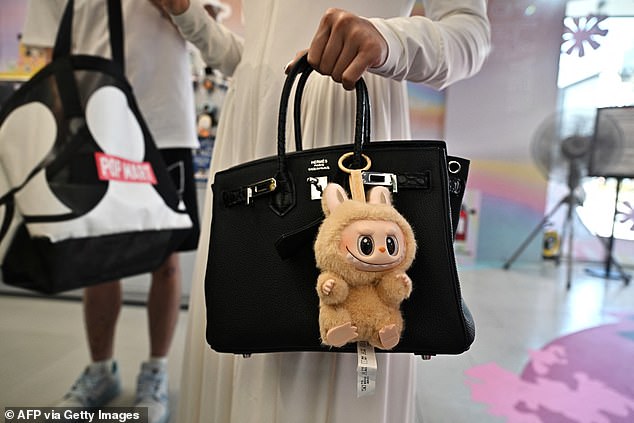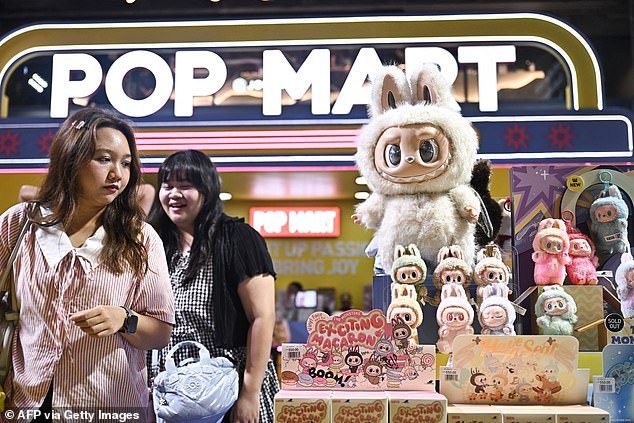Labubus, the small fluffy toys with bunny ears, big sparkling eyes and a sharp-toothed grin, have taken the world by storm in recent time – fans just can’t seem to get enough of them, forking out huge amounts of cash to get their hands on the coveted items.
Behind the colourful ugly-cute character is 38-year-old Wang Ning, the Chinese founder, chairman and CEO of Pop Mart International Group a toy company that has the exclusive rights to sell Labubu and other ‘blind box’ toys.
Pop Mart, which was founded by businessman Wang Ning, from Henan, has become known for selling toy characters that come in different colours, costumes, themes, or poses – the twist being that every toy is sold in a ‘blind box’, meaning shoppers don’t know exactly what item they are purchasing, until they open the box.
And the strategy worked: ‘the ‘surprise’ nature of buying a Pop Mart toy elevated the toys and figurines to collectible status, as fans sought to collect as many different ones as possible.
Labubus exploded in popularity this year after going viral on social media – notably TikTok – and now dozens of the fuzzy dolls can be seen hanging off the handbags of many fashionistas.
The collectables also have scores of celebrity fans, including Paris Hilton, Kim Kardashian, Rihanna, Lizzo, Cher, Michelle Yeoh, and even David Beckham. Even the queen of pop herself, Madonna, was recently pictured blowing out candles for her 67th birthday on a huge pink Labubu cake that was emblazoned with the pun ‘Madudu’.
Meanwhile, tennis star Naomi Osaka surprised fans when she walked onto the courts at the US Open with a bedazzled Labubu, which was covered in bright red diamonds and holding a tiny blue tennis racket. The toy is said to be worth a staggering US$495.

Wang Ning (pictured) the Chinese founder, chairman and CEO of Pop Mart International Group has been enormously successful thanks to his business strategy
The runaway success of Labubu toys has reportedly earned Wang a whopping US$20 billion since the start of 2025 – a sum that has more than tripled his net worth and rocketed his name up the rich list.
According to Forbes, Wang is now the youngest of the 10 richest billionaires in China and, with his US$27.5 billion fortune, ranks ahead of Alibaba tycoon Jack Ma, whose fortune stands at US$26.7 billion.
He ranks at number 78 on the Forbes Billionaires List, also ahead of PayPal co-founder Peter Thiel, whose net worth is US$23.7 billion, and Rupert Murdoch (US$24.6 billion).
Wang predicted that the toy maker could ‘easily’ reach US$4.2 billion in sales this year as the Labubu frenzy continues to send fans flocking to Pop Mart stores all over the world.
The starting price of the toys is £17.50 ($24), but rare or limited edition Labubus can cost hundreds, even fetching six figure sums at auctions, according to Which?.
The savvy CEO graduated from Zhengzhou University with a degree in advertising in 2009 and worked for a year at Sina Corporation, which owns Weibo, a social media platform often nicknamed China’s Twitter (now X).
It was after a trip to Hong Kong that Wang decided to found Pop Mart, having been inspired by a popular lifestyle store chain there called LOG-ON, which sold toys, stationery and cosmetics all in one place.
Initially, the company struggled to take off due to issues with inventory, staff and customer service, but Wang noticed that toys were the best-selling category and decided to focus on selling niche toys designed by artists.

The popular and highly covetable Labubu toys can be seen hanging off the handbags of many fashionistas

Fans of the Labubu toys will often fork out huge amounts of money in order to buy the specific collectables they want
Wang Ning is said to have been inspired by gashapon automatic distributors in Japan. These are vending machines that often sell toys in colourful solid-coloured capsule, meaning that its contents are a mystery to the buyer until they open them.
These capsules were a revelation to Wang and became the catalyst for blind boxes. The very first Pop Mart toy series to take off was a figurine called Molly, designed by Hong Kong artist Kenny Wong.
Molly, a little girl with a chic blonde bob, massive turquoise eyes and a signature pout, who comes in myriad forms with different costumes and poses, pushed Pop Mart sales to US$73 million in 2018 and accounted for 27 per cent of the business’ total sales in 2019.
Wang told Forbes in a 2020 interview that he largely lets the artists they work with have free rein over the toy designs, only stepping in to advise on consumer trends.
However, he keeps a close eye on the other details of the business, particularly over the Pop Mart stores – an important asset considering around half its sales are made at its physical outlets.
He is known to be obsessive over minute in-store details, such as the height of display tables to how bright the lights are.
‘The store itself is an accumulation of a decade of experience,’ he told Forbes. ‘We display so many different dolls in a small space, and we spend a lot of time on that alone.’
In an interview with China Central Television (CCTV) earlier this year, translated by Blind Box Daily, Wang was asked why he thought Labubu had become such a global sensation – despite the fact that the doll had originally been launched in 2015.
He replied that ‘trendy toys’ like Labubu were ‘once a niche consumer product’ but the market for them has grown, and with that, the fan base for such items.
Wang has also said he believes that Labubus’ appeal lay in their folklore roots, as the character is based on ‘an elf from the forest’, and the toy’s use of vinyl and plush materials aligns with that impression and makes it more popular.
Labubus were originally designed by Kasing Lung, a Hong Kong artist who was raised in the Netherlands and later settled in Belgium.
Kasing crafted the Labubu character as part of a story series he created, titled The Monsters, which was influenced by Nordic folklore. The character was introduced in 2015 but started becoming more popular in 2019 after a collaboration with Pop Mart.
Wang described trendy toys like Labubu as beingcomparable to art forms like ‘painting and sculpture’, which are ‘pure forms of artistic expression’.
‘Trendy toys are not the kind that can jump, dance or sing; they may just be decorative items, a form of companionship, or a type of art and emotional consumption,’ he explained.
‘For example, if people want to feel happy, be healed, or have company, we address these emotional needs through the designs of artists.’
Wang now has ambitions for Pop Mart to become a worldwide phenomenon. He told CCTV: ‘We originally hoped to become China’s Disney; now we hope to become the world’s Pop Mart.
‘We use China’s manufacturing industry and market to incubate artists from all over the world, and bring their creations back out to the world.’
He noted that sales outside of China ‘will likely surpass domestic sales’ this year, with sales in North America expected to exceed those in last year’s top-performing overseas market, Southeast Asia.












